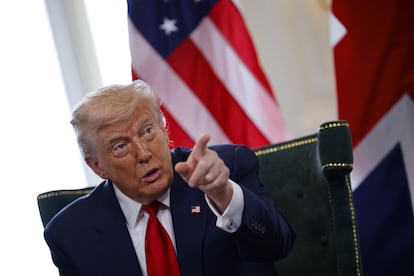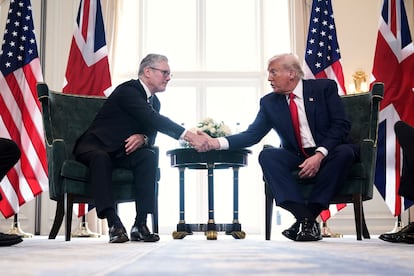The escalating humanitarian crisis in Gaza has begun to shift the dial on the rhetoric of US President Donald Trump, who has publicly warned Israel that it will have to approach the conflict “differently.” Days after the United States and Israel walked off the negotiating table over a potential ceasefire in Gaza, Trump on Monday took issue with Israeli President Benjamin Netanyahu, who denies that there is a large-scale famine among the Palestinian population: “Based on television, I would say I don’t particularly agree with Netanyahu because those children look very hungry.”
Regarding Ukraine, the other major conflict that captured the attention of Trump's meeting with British Prime Minister Keir Starmer this Monday in Scotland, the Republican leader maintained the tough tone he has displayed in recent weeks with Russian President Vladimir Putin, setting a new deadline—"of 10 or 12 days"—to end the war.
Trump has said he feels"very disappointed" in Putin."Five times we've been close to an agreement, and every time, Putin starts launching missiles at some city, like kyiv, killing a lot of people in nursing homes or something, and you have bodies everywhere," he denounced. As a result, he threatened to"reduce those 50 days" he had given the Kremlin leader two weeks ago to end the conflict. Otherwise, he will face severe sanctions in the form of a tariff offensive."I think I already know the answer to what's going to happen," he denounced. After the start of the meeting with Starmer, he estimated the deadline given to Putin at"10 or 12 days."

In addition to Gaza and Ukraine, Starmer is determined to address the trade relationship between the two countries, which remains fraught with uncertainty despite the bilateral agreement announced in May. The Prime Minister is seeking improvements in areas eligible for tariff reductions, such as steel and aluminum, whose British exports are currently subject to 25% tariffs, half of those imposed on the EU. Given the humanitarian crisis in Gaza, the goal is to urge the US leader to take a tougher line on Israel, with the aim of resuming ceasefire talks.
Speaking to the media after hosting Starmer at one of his golf resorts in Scotland, the US president considered that"a ceasefire is possible," but clarified that "the conflict will have to be a little different," a less forceful position than that of his guest, who openly declared that there is"a humanitarian crisis" in Gaza.
"This is an absolute catastrophe," the British prime minister said. Starmer's harshness is understandable, given the increasing international and domestic pressure in the face of the deteriorating situation, which has led hundreds of British MPs and leading members of his government to demand that the United Kingdom follow France's lead and formally declare recognition of the Palestinian state.
Gaza, in fact, is one of the key issues in the British Prime Minister's briefcase for his informal meeting with Trump, ahead of his state visit to the United Kingdom in mid-September. Trade relations and Ukraine are the other two components of the triptych for a meeting convened to take advantage of the US president's four-day stay in his mother's homeland. Like the President of the European Commission, Ursula von der Leyen, he had traveled to Scotland over the weekend to finalize the trade agreement between the European Union and the United States. This time, it was the Labour leader's turn, who attended Trump's meeting with his wife, Victoria.
In addition to his message to Netanyahu's administration, the US president also had words for Hamas, accusing it of being"unwilling to talk" and using the hostages held captive "as their shield." "If they didn't have those hostages, the situation would be very different," he later declared at the start of the meeting with Starmer, about which both agreed that Gaza was"one of the main reasons" they had come together.
In Donald Trump's diplomatic handbook, it is the US president who acts as host to the British prime minister, despite being on British soil and on what the White House has described as a"private visit." Starmer's plane arrived this morning at Prestwick Airport in Glasgow to spend the day with Trump, first at his golf resort in Turnberry, a town of just 200 people in southwest Scotland, and then at Trump's resort on the east coast of Scotland, in Aberdeenshire.
Starmer has a clear rapport with Trump, who again praised him lavishly during their meeting in Scotland on Monday. Despite belonging to different political families, the two have displayed remarkable rapport in their successive meetings. Proof of this is the prime minister's significant presence in Trump's private agenda this Monday, not only sharing a coast-to-coast trip to Scotland, but also a private dinner.

The result of this unexpected personal connection has its practical effect, as the United Kingdom is one of the few powers to which the 10% tariff threshold imposed by the Trump administration applies. This threshold is also favored by the fact that, unlike the EU, there has historically been no deficit in the trade relationship that benefits the British. Even so, London is seeking an even larger reduction, especially in the automotive and pharmaceutical industries, despite resistance from Washington.

